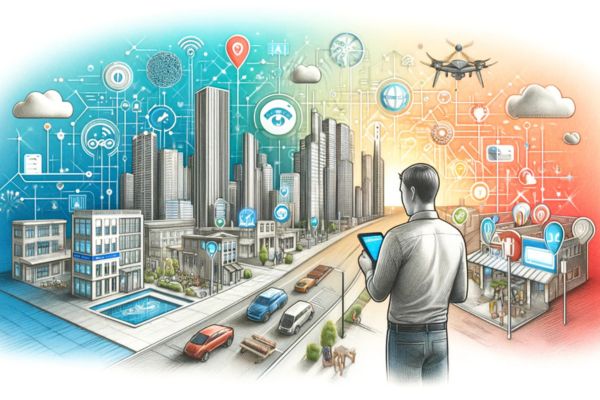According to Precedence Research, the global AI in smart cities market size is expected to reach around USD 460.47 billion by 2034 increasing from USD 39.62 billion in 2024, with a CAGR of 27.80%.
AI in Smart Cities Market Key Points
- North America dominated the global AI in Smart Cities market with the largest share in 2024.
- Asia Pacific is expected to post the fastest CAGR in the market from 2025 to 2034.
- By technology, the machine learning segment held the largest market share in 2024.
- By technology, the computer vision segment is projected to grow at the fastest rate during the forecast period.
- By application, the traffic management segment led the market in 2024.
- By application, the infrastructure management segment is anticipated to record the fastest growth through 2034.
- By deployment mode, the cloud-based segment was the market leader in 2024.
- By deployment mode, the on-premises segment is forecast to achieve the highest CAGR between 2025 and 2034.
AI in Smart Cities: Overview
AI (Artificial Intelligence) in Smart Cities refers to the use of intelligent technologies such as machine learning, computer vision, natural language processing, and data analytics to improve urban infrastructure, services, and quality of life. By analysing massive datasets in real-time, AI helps cities become more efficient, sustainable, and responsive to residents’ needs.
Key Applications:
Traffic and Transportation Management: AI-powered systems optimize traffic flow, predict congestion, manage public transportation schedules, and support autonomous vehicle integration.
Public Safety and Surveillance: AI enhances security through facial recognition, anomaly detection, and predictive policing.
Energy Management: Smart grids and AI-driven systems optimize electricity usage, reduce waste, and support renewable energy integration.
Waste Management: AI helps in route optimization for garbage collection and recycling efforts by predicting waste generation patterns.
Infrastructure Management: AI assists in monitoring infrastructure health (e.g., bridges, roads) to predict maintenance needs and prevent failures.
Environmental Monitoring: AI tracks air quality, noise pollution, and weather conditions to help cities implement greener policies.
Smart Governance and Citizen Services: Chatbots, digital assistants, and AI-based portals improve access to government services and streamline administrative processes.
Market Scope
| Report Coverage | Details |
| Market Size by 2034 | USD 460.47 Billion |
| Market Size in 2025 | USD 50.63 Billion |
| Market Size in 2024 | USD 39.62 Billion |
| Market Growth Rate from 2025 to 2034 | CAGR of 27.80% |
| Dominating Region | North America |
| Fastest Growing Region | Asia Pacific |
| Base Year | 2024 |
| Forecast Period | 2025 to 2034 |
| Segments Covered | Application, Technology, Deployment Mode, Regions |
| Regions Covered | North America, Europe, Asia-Pacific, Latin America, and Middle East & Africa |
Market Drivers
Several key factors are propelling the AI in Smart Cities market forward. Rising urban populations have created a pressing need for smarter, more efficient urban solutions. Increasing investments in smart city projects, along with advancements in AI and IoT technologies, are further accelerating market growth.
Government policies and initiatives aimed at sustainable development and improved urban management are also major drivers. Moreover, the growing demand for real-time data analytics and automation in city operations is reinforcing the adoption of AI across various urban sectors.
Opportunities
The market offers significant opportunities for innovation and growth. Emerging applications such as autonomous transportation, AI-powered healthcare systems, and predictive maintenance of infrastructure present new frontiers for development. The integration of AI with 5G networks and edge computing is expected to unlock even greater potential by enabling faster, more efficient data processing.
Additionally, there is growing opportunity in developing countries, where rapid urbanization and smart city initiatives are gaining momentum. Public-private partnerships and international collaborations are also opening doors for new projects and solutions.
Challenges
Despite its promising outlook, the market faces several challenges. Data privacy and security concerns are among the top issues, as smart city projects involve the collection and processing of vast amounts of personal and sensitive data. The high cost of implementing AI infrastructure, along with the complexity of integrating AI with legacy systems, can also hinder adoption.
Moreover, the lack of standardized regulations and policies across different regions creates uncertainty and can slow progress. Addressing these challenges is essential for sustainable market growth.
Regional Insights
Regionally, North America has led the AI in Smart Cities market, driven by strong technological infrastructure, substantial investments, and early adoption of smart city initiatives. Europe is also a significant player, with a focus on sustainability and stringent environmental regulations. Asia Pacific is emerging as the fastest-growing region, thanks to rapid urbanization, government-backed smart city programs, and increasing investment in AI technologies.
Countries like China, India, and Japan are at the forefront of this growth. Meanwhile, the Middle East and Latin America are showing rising interest, supported by infrastructure development and new smart city projects
Segmental Analysis of AI in Smart Cities Market
Application Outlook
Among the various applications, traffic management stands out as the dominant segment in 2024. The integration of AI in urban transportation systems is addressing the challenges of congestion and inefficiency, offering real-time data analysis and decision-making capabilities that optimize traffic flow and improve commuter experiences.
Infrastructure management is poised to be the fastest-growing application segment, as cities increasingly rely on AI for predictive maintenance, resource allocation, and process optimization. Other key applications include smart public safety, healthcare, education, and government services, all leveraging AI to enhance service delivery and operational efficiency.
Technology Outlook
Machine learning leads the technology segment, capturing the largest market share in 2024. Its ability to process vast datasets, recognize patterns, and automate decision-making is revolutionizing urban utilities, waste management, and citizen engagement.
Meanwhile, computer vision is anticipated to witness the fastest growth, driven by its adoption in surveillance, traffic monitoring, and smart infrastructure. Real-time visual data analysis provided by computer vision technologies is significantly improving safety, resource management, and maintenance operations across smart cities.
Deployment Mode Outlook
Cloud-based deployment dominates the market, attributed to its scalability, integration capabilities, and cost-effectiveness. Cloud solutions enable cities to manage large volumes of data without heavy infrastructure investments, facilitating seamless integration and enhanced decision-making.
However, on-premises deployment is expected to grow rapidly, particularly in areas where data security, customization, and integration with legacy systems are paramount-such as public safety, intelligent transportation, and infrastructure management.
AI in Smart Cities Market Companies
IBM Corporation: IBM is a pioneer in deploying AI-driven solutions for smart cities, focusing on data analytics, cognitive computing, and cloud-based platforms. Their technologies help cities optimize traffic, energy, and public safety operations, enabling more efficient resource management and improved citizen services.
Huawei Technologies Co., Ltd.: Huawei leverages its expertise in telecommunications and AI to provide integrated smart city platforms. The company’s solutions address urban challenges such as smart transportation, energy management, and public safety, often through large-scale IoT and AI deployments.
Intel Corporation: Intel supplies the essential hardware and AI chipsets that power smart city infrastructure. Their technology enables real-time data processing for applications like traffic management, surveillance, and environmental monitoring, supporting faster and more efficient urban operations.
Google: Google contributes to smart cities through its AI, cloud, and data analytics services. Their platforms help cities analyse massive datasets, optimize transportation, and enhance digital services for residents, making urban environments more responsive and connected.
Microsoft Corporation: Microsoft offers cloud-based AI solutions that support a range of smart city applications, from predictive maintenance of infrastructure to intelligent traffic and energy systems. Their Azure platform is widely used by municipalities to integrate and scale smart city projects.
Cisco Systems, Inc.: Cisco is a leader in smart city networking and IoT infrastructure, providing secure connectivity and AI-enabled analytics. Their solutions facilitate real-time monitoring of city assets, traffic, and public safety systems, enabling cities to become more agile and resilient.
Siemens AG: Siemens applies AI in smart infrastructure, energy management, and mobility solutions. Their platforms enable cities to automate building operations, optimize energy consumption, and improve public transportation efficiency, contributing to sustainability and quality of life.
Oracle Corporation: Oracle delivers AI-powered cloud applications for smart city functions such as customer engagement, supply chain management, and data-driven decision-making. Their platforms help cities streamline operations and improve citizen services through advanced analytics and automation.
SAP SE: SAP provides integrated platforms for data collection, analytics, and process automation in smart cities. Their solutions enable end-to-end management of city services, including smart traffic, health, and public administration, supporting real-time insights and efficient service delivery.
Schneider Electric: Schneider Electric uses AI to optimize urban energy usage, reduce waste, and enhance building efficiency. Their smart systems, such as intelligent HVAC and lighting controls, help cities achieve sustainability goals and lower operational costs.
General Electric (GE): GE has contributed to smart cities through platforms like CityIQ, which use AI for video analytics, traffic optimization, and public safety. Though GE has shifted focus to LED lighting and connectivity, its legacy solutions continue to impact urban management and smart infrastructure.Source: https://www.precedenceresearch.com/ai-in-smart-cities-market

















